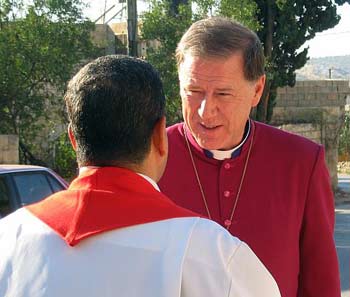Archbishop Fred Hiltz, Primate, says he feels “great relief” that the United Nations Relief and Works Agency has granted a six-month bridging contract to the Ahli Arab Hospital, an Anglican ministry in Gaza City, Gaza Strip, that serves some 1 million people. On June 1, UNRWA had announced they would no longer fund the hospital after 20 years of partnership.

“I feel great relief for the people whom the hospital serves and for Bishop Suheil Dawani who was distraught over the fact funding was cut,” said Archbishop Hiltz. “It could potentially spell the end of that important piece of ministry for the Diocese of Jerusalem.”
Earlier this year, UNRWA moved to an open tender process for inpatient services in the region, citing the increasing number of private health care providers. On June 1, UNRWA announced that the Ahli Arab Hospital did not win the tender. This decision would cost the hospital about $1 million a year-nearly half of its budget.
Anglican and ecumenical partners spoke out around the world, including the Primate, who wrote to Prime Minister Stephen Harper asking that the federal government re-commit funds to the UNRWA so they could support the hospital. No response has been received from the Prime Minister’s Office.
On July 26, the Episcopal Diocese of Jerusalem announced that UNRWA funding had been extended for six months, allowing the hospital to honour its contracts to the end of 2012 and giving it time to seek alternate funding sources.
“We are absolutely committed to keeping the Ahli Arab Hospital open, as it is the only Christian hospital in the Gaza Strip and 90% of the staff are themselves refugees,” said Bishop Suheil Dawani in a press release.
“However, we know that we need to move quickly to help the hospital transition to a different model so that it is not financially dependent on UNRWA from 2013 and so that donors can have confidence to continue to invest in equipment and programs.”
The Ahli Arab Hospital has 80 beds and its departments include general surgery, internal medicine, emergency and ambulance services, and obstetrics. The hospital also runs free medical missions to the poor twice weekly, specialized free clinics for chronically ill elderly women, and free care for burn injuries and underweight or malnourished children.
Health care is an important ministry in the Episcopal Diocese of Jerusalem, which extends over Israel, Jordan, Lebanon, the Palestinian Territories, and Syria.
The Anglican Church of Canada contributes to the Ahli Arab Hospital and other ecumenical services to Palestinian refugees in Gaza and elsewhere.
The Primate hopes that the new Canadian Companions of the Diocese of Jerusalem will consider fundraising work to support health care initiatives in the diocese, perhaps focusing on Oct. 23, the feast of St. James of Jerusalem. He noted that the Diocese of Jerusalem is expanding its health care services, including into Ramallah.
Archbishop Hiltz has seen this health care ministry first hand. In May 2012 he visited the diocese with General Synod’s Global Relations Coordinator Dr. Andrea Mann. Their stops included the Ahli Arab Hospital.
“My experience of the hospital is that it’s non-partisan, non-sectarian, it ministers to people who are in huge need,” said Archbishop Hiltz.
“Many live in desperate conditions in the region and the hospital treats them with the utmost respect. The staff members are so impressive in terms of their devotion to their work.”
- Read the Episcopal Diocese of Jerusalem’s July 26 announcement of the bridging contract
- Learn about the Anglican Church of Canada’s relationship with the Episcopal Diocese of Jerusalem
- Read more about the Canadian Companions of the Episcopal Diocese of Jerusalem
- Interested in donating to the hospital? Contact Archdeacon John Robertson, national gift planning officer, by email or phone: 1-888-439-GIFT
Interested in keeping up-to-date on news, opinion, events and resources from the Anglican Church of Canada? Sign up for our email alerts .
